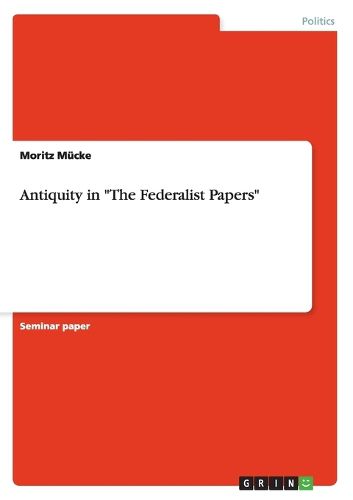Readings Newsletter
Become a Readings Member to make your shopping experience even easier.
Sign in or sign up for free!
You’re not far away from qualifying for FREE standard shipping within Australia
You’ve qualified for FREE standard shipping within Australia
The cart is loading…






Seminar paper from the year 2014 in the subject Politics - International Politics - Region: USA, grade: 1,3, course: The Federalist, language: English, abstract: The significance of antiquity and of examples drawn from antiquity during the American founding era is contested among scholars. While Hannah Arendt asserted that without the classical example the American revolutionaries, “conscious of emulating ancient virtue, ” would not have had the courage to rebel, Bernard Bailyn famously suggested that frequent references to antiquity were merely “illustrative, not determinative” of revolutionary thought. As familiarity with antiquity was evident during the Revolutionary War, it is less clear what role it played in the construction of the new American regime under the constitution of 1787, a time during which not virtuous warfare but positive political philosophy was called for. Hence, a thorough examination of The Federalist shall serve to illuminate the extent to which the founding generation’s political science was inspired by ancient precedent, resulting in the conclusion that examples drawn from antiquity did not supersede those drawn from other periods in human history, and that therefore no unique or special status can be ascribed to antiquity in this context.
$9.00 standard shipping within Australia
FREE standard shipping within Australia for orders over $100.00
Express & International shipping calculated at checkout
Seminar paper from the year 2014 in the subject Politics - International Politics - Region: USA, grade: 1,3, course: The Federalist, language: English, abstract: The significance of antiquity and of examples drawn from antiquity during the American founding era is contested among scholars. While Hannah Arendt asserted that without the classical example the American revolutionaries, “conscious of emulating ancient virtue, ” would not have had the courage to rebel, Bernard Bailyn famously suggested that frequent references to antiquity were merely “illustrative, not determinative” of revolutionary thought. As familiarity with antiquity was evident during the Revolutionary War, it is less clear what role it played in the construction of the new American regime under the constitution of 1787, a time during which not virtuous warfare but positive political philosophy was called for. Hence, a thorough examination of The Federalist shall serve to illuminate the extent to which the founding generation’s political science was inspired by ancient precedent, resulting in the conclusion that examples drawn from antiquity did not supersede those drawn from other periods in human history, and that therefore no unique or special status can be ascribed to antiquity in this context.